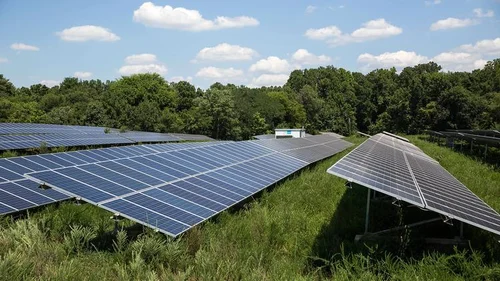UNited Patriots Assocation
Archives
US Department of Energy Cancels $13 Billion in Green Energy Funding
SIGN UP FOR OUR NEWSLETTER
US Department of Energy Cancels $13 Billion in Green Energy Funding |
Decision Sparks Debate Over America's Energy Future and Economic Implications |

Thomas Caldwell
Sep 29, 2025
The U.S. Department of Energy (DOE) has announced plans to cancel over $13 billion in funds previously allocated for renewable energy projects, including wind, solar, battery storage, and electric vehicles.
This move signifies a substantial shift in the nation's energy policy.
In a statement released on September 24, 2025, the DOE emphasized its commitment to returning these funds to taxpayers, aiming to promote more affordable and reliable American energy sources.
Energy Secretary Chris Wright stated, "By returning these funds to the American taxpayer, the Trump administration is affirming its commitment to advancing more affordable, reliable, and secure American energy and being more responsible stewards of taxpayer dollars."
This decision has ignited a heated debate among policymakers, industry leaders, and environmental advocates.
California Governor Gavin Newsom criticized the move, expressing concerns that the U.S. is relinquishing its leadership in clean energy to countries like China.
California, known for its ambitious clean energy goals, views this federal decision as a potential setback to its environmental initiatives.
The specific programs and projects affected by this funding cancellation have not been disclosed, leaving many stakeholders in uncertainty.
However, the DOE's announcement aligns with the administration's broader strategy to prioritize traditional energy sources over renewable alternatives.
President Donald Trump has previously expressed skepticism about climate change, referring to it as "the greatest con job" during his address to the United Nations General Assembly.
This perspective underscores the administration's focus on maximizing oil and gas production while reducing subsidies for renewable energy initiatives.
Industry analysts warn that this policy shift could have significant economic implications.
In 2024, jobs in the solar, wind, and other clean energy sectors grew three times faster than the rest of the U.S. workforce.
The cancellation of these funds may lead to job losses and hinder the growth of the renewable energy industry.
Furthermore, the decision may impact ongoing and future projects.
For instance, the DOE previously announced the termination of 24 awards totaling over $3.7 billion, citing that these projects failed to advance the energy needs of the American people and were not economically viable.
These cancellations primarily affected carbon capture and decarbonization initiatives.
The broader implications of this policy shift are still unfolding.
While the administration argues that returning these funds to taxpayers promotes fiscal responsibility, critics contend that reducing support for renewable energy could hinder the nation's progress toward a sustainable and diversified energy portfolio.
As the debate continues, stakeholders from various sectors are closely monitoring the situation to assess the long-term impact on the U.S. energy landscape.
In the meantime, the renewable energy industry faces a period of uncertainty, with companies and workers alike grappling with the potential consequences of these policy changes.
As the nation navigates this complex issue, the balance between economic interests, environmental concerns, and energy security remains at the forefront of the discussion.
For now, the future of green energy funding in the United States hangs in the balance, awaiting further developments and decisions from both federal and state authorities. |
